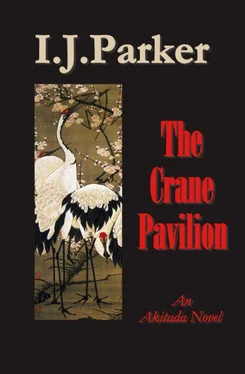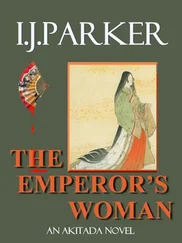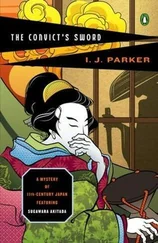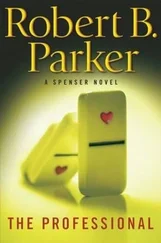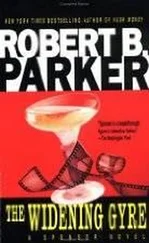I. Parker - The Crane Pavillion
Здесь есть возможность читать онлайн «I. Parker - The Crane Pavillion» весь текст электронной книги совершенно бесплатно (целиком полную версию без сокращений). В некоторых случаях можно слушать аудио, скачать через торрент в формате fb2 и присутствует краткое содержание. Жанр: Исторический детектив, на английском языке. Описание произведения, (предисловие) а так же отзывы посетителей доступны на портале библиотеки ЛибКат.
- Название:The Crane Pavillion
- Автор:
- Жанр:
- Год:неизвестен
- ISBN:нет данных
- Рейтинг книги:5 / 5. Голосов: 1
-
Избранное:Добавить в избранное
- Отзывы:
-
Ваша оценка:
- 100
- 1
- 2
- 3
- 4
- 5
The Crane Pavillion: краткое содержание, описание и аннотация
Предлагаем к чтению аннотацию, описание, краткое содержание или предисловие (зависит от того, что написал сам автор книги «The Crane Pavillion»). Если вы не нашли необходимую информацию о книге — напишите в комментариях, мы постараемся отыскать её.
The Crane Pavillion — читать онлайн бесплатно полную книгу (весь текст) целиком
Ниже представлен текст книги, разбитый по страницам. Система сохранения места последней прочитанной страницы, позволяет с удобством читать онлайн бесплатно книгу «The Crane Pavillion», без необходимости каждый раз заново искать на чём Вы остановились. Поставьте закладку, и сможете в любой момент перейти на страницу, на которой закончили чтение.
Интервал:
Закладка:
“Another day perhaps,” he said vaguely and saw Yuki’s face fall. “Perhaps you and I can exercise the horses later,” he added.
Yuki clapped his hands. “I’ll go brush them now, Father,” he cried and disappeared.
Tora and Hanae looked at each other.
“I feel ashamed,” he said. “I have so much, and the master …” His voice trailed off.
She nodded. “He hardly eats and spends all his time sitting in his dark room. And the children have become so quiet. It’s bad for all of them. What should we do?”
He sighed. “I don’t know. We have all tried. His family and his friends. We’re still trying. I’d better look in on him, but the gods know I hate seeing him like this.”
She nodded. “Stay with him. Talk to him. Mention the children. It may help.”
“I’ll try, but he always sends me away when I remind him of them.”
*
Saburo had spent the night with Shokichi, a prostitute he had met a year ago while investigating the murder of a brothel owner. He was very fond of Shokichi, the first and only woman to treat him as a normal man. The disfigurement of his face that made him look like a goblin had frightened both children and adults.
These days he no longer looked quite so terrifying. He had grown a mustache and beard that hid most of the worst scars and deformities, and he used a paste concocted by Lady Tamako to conceal the rest. Except for one eye that he had trouble controlling he looked almost normal. But Shokichi had liked him even when he was a monster. She almost had not recognized him when he returned from Kyushu and went to visit her.
In the beginning, he had been shy and very careful not to expect anything beyond friendship. In fact, he had kept his distance, merely taking her to a restaurant now and then, or to a temple fair, or for a walk by the river under the late-flowering cherry trees. And there she had finally burst into tears.
Dismayed, he had begged her forgiveness for whatever he had done.
“It’s what you haven’t done,” sobbed Shokichi.
“I’ll do it,” he cried. “Right away. Just tell me what it is.”
That had made her chuckle through her tears. “Oh, Saburo, How could you be so dense? I want you to make love to me.”
He had gaped at her.
“I want you to lie with me,” she had said more insistently. “A man should want to lie with a woman if he likes her. Don’t you want to? Ever?”
He had been speechless with delighted surprise. “Yes, of course, but … but-.” How to explain that he did not want her “services” but rather her love?
Her face fell. “Oh, Saburo. I’m sorry. I didn’t think. Is it that you cannot? Is it some wound? Something else those monsters did to you?”
Grinning foolishly, he had shaken his head. His arms had reached for her. And then he had kissed her so passionately that she had gasped, “Come, let’s go to my room now.”
And so Saburo had allowed himself to be seduced under the cherry trees and had made love to Shokichi ever since, as often as he could manage, to make up for years of near-celibacy.
His mind being thus occupied with love and being frequently away from home, he had been less affected than the others by the sadness which hung over the Sugawara compound. But he too had seen what his master had become. Most mornings, Saburo worked at estate matters by himself. On the few occasions when Akitada wandered into his study, he had merely stood for a moment, murmuring “Good Morning,” and then wandered out again. Saburo began to realize that his presence was what drove his master away. So he hurried with his work and left the place to the man who spent most of his time sitting there or on the veranda, brooding.
It was all very upsetting, and Saburo knew that Tora and Genba and the women were becoming frantic with worry. He felt guilty for escaping into the arms of Shokichi. And when he remembered Lady Tamako’s kindness to him and how she had mixed her pastes and paints until she achieved just the right shade for his skin, how she had understood his embarrassment, yet had been firm about teaching him her skill, then he felt most deeply ashamed. He had wept when the news had come to Kyushu. It pained him that they were probably thinking he did not care, that he, the most recent to join the Sugawara family, had not formed the bonds of loyalty and family they had. And so he fled whenever he could.
*
Genba’s wife was expecting a child. She had been afraid to hope. Her life as a prostitute had meant so many forced abortions that she had been certain she could no longer bear children. Or, what was even worse, she feared she might bear a deformed child. She watched him as he played with the master’s children, and tears rose to her eyes to think that she might disappoint him, this gentle mountain of a man who doted on children and animals and all things weak.
She pitied the master’s children, as did Genba. He spent too much time with them while chores were left undone. They should be more with their father, but he was so changed that he frightened them, and they much preferred Genba or Tora to keep them company.
Yasuko was getting to be a handful these days. She was seven now and lorded it over her little brother Yoshitada, Yoshi for short. Yoshi was five and timid. Tora frequently shook his head when Yoshi was fearful of the rough games his son Yuki played with Yasuko. To Ohiro’s mind, this was all backwards. Yasuko should be calm and ladylike, and her brother should be the one to play boys’ games. She had pointed this out to her husband, but he had simply laughed and said, “Children have their own ways. Just so long as they’re happy.”
But the master’s children were not really happy. They had cried and cried after their mother and their new brother had died. They had cried again when their father returned and had barely smiled at them. And now they stayed away from him, and he from them.
*
Akitada was unaware of the concern he caused his household. He was unaware of life around him in general. He ate what they brought him, answered their questions vaguely, stared at his children when they came to make their morning bows to him and murmured a greeting and the admonition to be good children and run along.
He was preoccupied with thoughts about the emptiness of his world. Not about the emptiness the Buddhist priests talked about when they meant the various human pursuits like lust, ambition, greed, desire, jealousy, and anger, but rather a very specific state affecting him alone, a man suddenly bereft of all that made his efforts meaningful. He no longer took pleasure in the beauty of the garden, the graceful movements of the koi in his pond, the challenge of tricky legal cases, or the discovery of a killer, and even-may the gods forgive him-the laughter of his children.
The swallows had returned to his house and had nested as before under the eaves outside his study. This had pained him, because the continuance of life was only a few steps from death. And there had been another death: the wisteria outside Tamako’s pavilion had died during the summer.
He read doom in this. Doom for himself and the rest of his life, which seemed to him to have begun with his marriage to Tamako, marked by his presenting her with a flowering branch from this very plant. The wisteria had been near death once before. That time they had drifted apart in mutual recriminations over Yori’s death. It had revived, as had their love. They had both become stronger. And now there was no more hope. What was he to do with himself?
A scratching at the door brought Tora. Akitada wished him away and did not greet him.
Tora glanced at the untouched bowl of rice and vegetables. “You must eat, sir,” he said.
“Leave me alone if you have nothing better to offer,” snarled Akitada.
Читать дальшеИнтервал:
Закладка:
Похожие книги на «The Crane Pavillion»
Представляем Вашему вниманию похожие книги на «The Crane Pavillion» списком для выбора. Мы отобрали схожую по названию и смыслу литературу в надежде предоставить читателям больше вариантов отыскать новые, интересные, ещё непрочитанные произведения.
Обсуждение, отзывы о книге «The Crane Pavillion» и просто собственные мнения читателей. Оставьте ваши комментарии, напишите, что Вы думаете о произведении, его смысле или главных героях. Укажите что конкретно понравилось, а что нет, и почему Вы так считаете.
